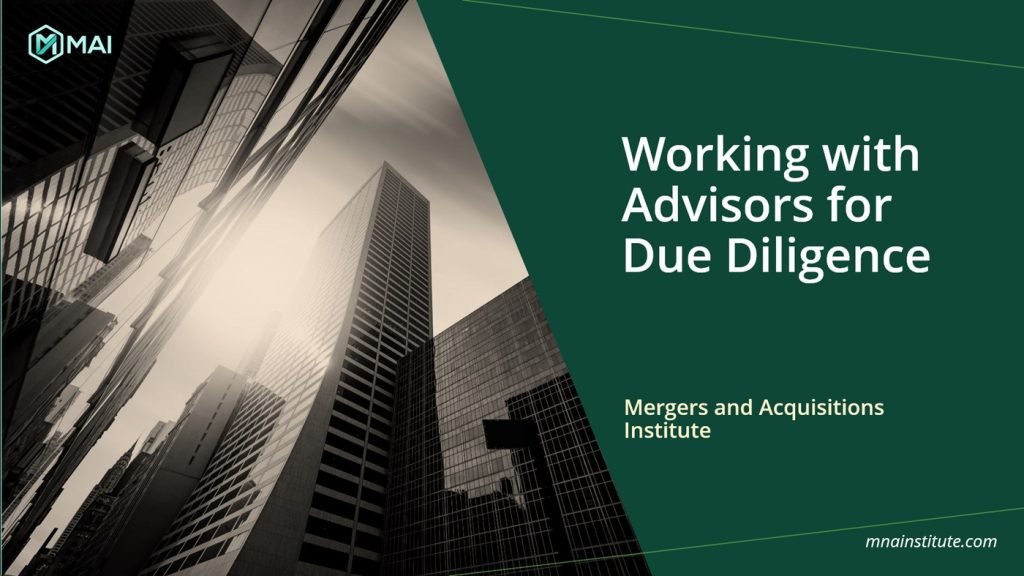Working with M&A advisors
Working with M&A advisors for Due Diligence can be something that you or your company are considering. This can provide many benefits to your acquiring or merging of businesses. It can also come with complications.
Should a buyer hire an M&A advisor?
There is no law requiring a buyer to hire external M&A advisors in M&A due diligence. However, hiring the right M&A advisors at the right time is good for the following reasons.
- First, M&A advisors have extensive due diligence experience and specialised knowledge. So, they are adept at conducting due diligence, writing reports, and making judgments for a given short period.
- Second, they are all specialists in each appropriate field, such as accounting, tax, and legal affairs. As such, they’re not only good at spotting problems but also pretty good at solving them in general.
- Third, while the M&A advisors deal with difficult problems you cannot solve, you, the M&A TF team of the acquiring company, can focus on creating commercial synergies after the acquisition.
- Fourth, the M&A process involves many stakeholders. For example, when you need acquisition financing, you should submit relevant data to external financial institutions like banks. In that case, reports written by M&A advisors can be a better reference.
- Finally, they can objectively address the risks of the target company. Suppose the decision maker of the acquiring company is obsessed with the target company. Then, as a practitioner, you may find it difficult to report the risks of the target company. However, the M&A advisors are a third party. Therefore, they have no difficulty providing objective data on the target company.

However, selecting the right M&A advisors is very important because they are expensive. That’s why you should be able to use them well to shorten the duration of the M&A deal process and reduce the costs to be paid for M&A.
Acknowledging Benefits and Complications
You should acknowledge a few important details when you work with M&A advisors.
- Firstly, the buyer, not the M&A advisors, must control the transaction’s lead.
Many acquirers assume that M&A advisors would direct them, controlling due diligence. But this is never the case. They are M&A advisors to you, not decision-makers. Decisions rest with you, and M&A advisors serve only to provide advice. So, as a buyer, you must be able to give specific instructions to your M&A advisors.
You won’t get what you expect from their due diligence reports unless you direct them properly. For this, you should have project management skills, meaning you need to know which teams to assign to which tasks in order to achieve your goal from the transaction. If you don’t prepare for that, your advisors may assume you will do as they say.
- Secondly, the buyer must brief their advisors on what to do exactly before conducting due diligence.
- Explain to your advisors what the purpose of the acquisition is. Then, your advisors would know which parts of the target company to focus on and which issues to deal with in depth.
- Let them know the transaction’s timetable. Then, the M&A advisors would allocate their tasks appropriately, according to the timeline.
- Explain which M&A advisors will be responsible for which part when multiple M&A advisors are involved. Then, they would allocate what area each one would take charge of.
- Explain to them exactly what you expect from the due diligence report, or they will present too much raw data in the report, and you will spend too much time reviewing it.
- Inform them of the specific risks of the target company if you know its sector well. Your advisors may not have as much industry knowledge as you.
- Explain the deal structure to them. For example, stock purchases and asset purchases take different forms. M&A advisors need to know it so that they can properly pinpoint the risks that result from the structure of the deal.

How to select M&A advisors
When selecting M&A advisors, it is a good idea to get bids from several M&A advisors, score each against internal criteria, and select the advisor with the highest score.
The following are criteria that buyers should consider:
- M&A Advisors’ Experiences: The buyer should evaluate the M&A advisors’ experiences and reputation in the market. But the experiences here mean not only experiences in due diligence but also experiences on the buy-side and experiences in the target company’s sector. While the M&A advisors’ reputation is important, the individual qualities of the team are most important. So you should not only look at the company’s name but also check who the team consists of. Big firms might also include some juniors on their teams to give them a chance.
- Check the team size and capacity: The buyer should ensure the M&A advisors have the capacity and resources to handle the due diligence process. This includes checking the advisor’s team size, availability, and the technology and tools they use. Especially for the size, teams should be kept small. You might think the more team members are, the better. However, the more people doing the work, the more information is distributed among them. Rather, it’s better when a few competent experts can see the entire company with deeper insights.
- Review the due diligence advisors’ methodology: The buyer should also review the due diligence advisors’ methodology to ensure that it is comprehensive, structured, and tailored to the specific transaction. While it matters how much sector knowledge they have, having the right experts asking the right questions from the right sources is of utmost importance. No matter how well they know the industry, it would not be helpful if they couldn’t conduct good research by asking the right questions.
- Evaluate the M&A advisor’s communication skills: The buyer should evaluate their communication skills to ensure they can effectively communicate complex information to you. The importance of communication has already been mentioned. Communication also builds the chemistry between the buyer and the M&A advisors. While technical skills and experience are important in choosing which M&A advisors should do which job, it’s also important to see the personal chemistry.
- Obtain referrals: The buyer should obtain referrals from other clients who have worked with the M&A advisors to fully understand their experience and level of satisfaction.

Advisory Fees
The fee for M&A due diligence can vary depending on several factors. But, there is some general information on the fee structure for M&A due diligence. The fee is usually either based on a fixed fee or an hourly rate.
- A fixed fee is typically based on the scope of the due diligence, the complexity of the deal, and the size of the target company. The fixed fee can range from tens of thousands to several hundred thousand dollars.
- Hourly rates can vary depending on the seniority and expertise of the M&A due diligence advisor, ranging from $200 to $1,000 per hour or more. But usually, due diligence is done on a fixed fee basis.
- In some cases, M&A advisors may also charge a success fee, which is a percentage of the deal value. This fee is typically only applicable if the deal closes successfully. The exact fee charged here depends on whether the transaction is completed. It’s common for fees to be discounted if a deal doesn’t go through and raised if it does. It could range from a slight up and down to a 100% success fee.
- That fee structure is a great way to minimise costs if a deal doesn’t go through, but they give advisors a vested interest in writing positive reports, which presents an obvious conflict of interest.
How much the fee varies from the benchmark is up to the advisor and the buyer to negotiate.
Sources and Further Reading
We have looked at this company’s websites and external information to provide you with examples within this post. Check them out here:
- Three Overlooked Benefits Of Working With A Financial Advisor (forbes.com)
- Biggest M&A financial advisors by deals UK 2022 | Statista
If you have found the information insightful, head over to the M&A Institute, log in and start our online courses now. Or go to our Youtube Channel for further watching!


